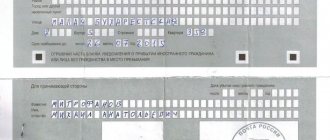Today, the issue of registration among citizens is especially acute. And it is not always possible to register a husband with his wife in a privatized apartment. Registration requires the right actions and legal knowledge.
Dear readers! Our articles talk about typical ways to resolve legal issues, but each case is unique. If you want to find out how to solve your particular problem, please use the online consultant form on the right or call. It's fast and free!
The popularity of the registration institute is determined primarily by problems associated with violation of the registration procedure, its implementation in non-existent real estate objects or registration without the consent of the owner. This all leads to the need for close monitoring by authorized bodies.
If the wife is the owner of the apartment, she will be able to register her husband with her, for which she must submit an application and a package of documents to the passport office at her place of residence. A child born in marriage will be registered at the place of registration of the mother.
Husbands often refer to this if their wives are registered and live in more favorable conditions, and do not want to register in another property. Meanwhile, their relatives, who are also owners, may legally be against the registration of the spouse.
How to register a husband with his wife in a privatized apartment?
Such nuances can lead to divorce, which requires an understanding of further actions, knowledge of registration rules and legal knowledge.
Registration rules
The basic registration rules include:
- After purchasing an apartment or having a child, it is done at the place of actual residence.
- Documents must be submitted within 7 days after purchasing the property.
- Registration is carried out in accordance with the Constitution of the Russian Federation, legislative acts regarding the movement of citizens and their choice of place of residence, and decrees of the Government of the Russian Federation regulating the powers of FMS employees. They, in turn, are guided by the Housing, Civil, Tax and Family Codes.
- The result is issued to the applicant within 3 working days.
- After a positive decision is made by the FMS authorities, the spouse acquires the right to permanent residence, and if difficult situations arise, he can only be discharged from an apartment or other real estate through a judicial procedure. At the same time, he is not given the rights to manipulate it, but he undertakes to pay utility bills for his part.
- It is not possible for a spouse to register in a privatized apartment without the consent of other owners.
- Registration is possible by court decision if the spouse refuses to register in the jointly purchased apartment.
Required documents
If there are other owners in the property, their consent is required.
The rest of the package of documents consists of:
- passports - it will contain a stamp indicating the place of registration;
- upon provision of another identification document, the applicant will receive a registration document;
- spouse's statement;
- the right to establish documentation for the property;
- consent of representatives of minor children in the form of a notarial document or personal presence when registering a residence permit;
- extract from the house register;
- departure sheet from the previous place of registration;
- receipt of payment of state duty.
Application for registration at place of residence - sample
How to make an application correctly?
An application for registration at the place of residence is drawn up at the territorial office of the Federal Migration Service and submitted within 7 working days after the move.
The document is drawn up in Form No. 6 and contains:
- name of the federal authority at the place of filing the application;
- FULL NAME. registered person;
- date of document preparation;
- previous place of registration;
- FULL NAME. provider of housing and who is related to the applicant;
- passport details of both spouses;
- date and details of both parties.
Possible difficulties and recommendations on how to avoid them
Registration without ownership rights gives a citizen only the right to use housing. He cannot sell it, donate it, rent it out, and so on. That is, registration allows the registered person only to live there.
It is possible to discharge a relative without his consent, like any other person, only through a judicial procedure. In the case of a minor, this is quite difficult even through the court.
You can protect yourself from force majeure circumstances by concluding a notarial agreement with a relative , which will clearly state the conditions of living in the apartment, if not met, he will be forcibly evicted. If there is such an agreement, the deregistration will also be carried out through the court, but much faster - the owner will have indisputable evidence that he is right.
The owner also needs to remember that fictitious registration is subject to liability under Article 322.2 of the Criminal Code of the Russian Federation:
- Correctional work.
- Material penalties in the amount of 100,000 to 500,000 rubles.
- Imprisonment for up to 3 years.
You can avoid an unpleasant situation due to the registration of a relative or a stranger in your living space if you draw up a notarized agreement and comply with legal requirements.
How to register through the State Services portal?
Previously, the application was submitted exclusively at the passport office, but today registration is possible on the State Services portal.
To do this you need:
- register on it;
- click on the “Federal Migration Service” tab;
- follow the link “Registration of citizens of the Russian Federation at the place of stay and place of residence within the Russian Federation”;
- check the box for “Electronic only;
- click the “Get service” button;
- select an area;
- enter the details of the registered person, including the address of the previous place of registration;
- fill in information about the owner of the property and information from his title document for the property;
- enter statistical data;
- indicate the name of the registration authority of the Federal Migration Service.
Note! Next, the applicant receives a letter confirming his successful registration. The response time is 1-2 business days, after which they call for an appointment at a specific time.
The main disadvantage of registering relatives in your apartment
The permanent registration of an aunt, nephew or second cousin on your square meters entails an inevitable increase in utility bills. If cold, hot water, gas and heating are calculated by meters, you will pay only according to their readings. But payment for housing maintenance, for example, for garbage removal, is calculated depending on the number of people living in the apartment. And if there are no meters, utility services will require payment according to established standards for each registered person.
Even if a relative registered in your apartment does not live in it, you will not be able to demand a reduction in utility bills.
Is it possible to register a husband without the consent of other owners?
Such an easy registration method creates a temptation to register a spouse without the consent of other owners. But this is not possible based on Article 247 of the Civil Code of the Russian Federation.
Actions if the owners disagree with the husband’s registration:
- The owner of a share has the right to dispose of it only with the consent of the owners of other shares of the same property. If consent is not obtained, a spouse can only be registered in court.
- The owner of the share has the right to provide the registered person only with the area that corresponds in size to that specified in the ownership document. If this is not possible, the remaining owners of shares in one object have the right to demand appropriate compensation.
Attention! If the wife’s share is not excessively small, but corresponds to the size of at least one room in the apartment, then, according to the Housing Law, the registration of a spouse does not entail infringement of the rights of other owners, and in the absence of their consent, this issue is easily resolved in court. Especially if the spouse purchased everything necessary for expensive repairs, reconstruction, etc. Some husbands also do these same actions in the event of a possible divorce, when such a share may become recognized as jointly acquired property.
Consent from common apartment owners
The issue of a wife registering with her husband in privatized housing, or vice versa, can be resolved without problems in the case where the square meters are privately owned by the spouse. The situation is completely different if the apartment is owned by several cohabitants. In this case, in order to register a new person in a residential area, it is necessary to obtain consent from all other citizens living in this territory.
In obtaining such an agreement, many nuances and problems arise, since not everyone is waiting for a new tenant. Registration in an apartment does not give any ownership rights to the new neighbor. But at the same time, many people simply do not want to register someone. If, for example, the spouses quarrel and get divorced, then it will not be so easy to remove the husband or wife from the home. Here you will have to go to court, and this is a waste of time. In addition, in resolving such issues, representatives of the judiciary very often give a delay. If the question of the spouse’s discharge becomes very pressing, you may have to sell the home, but at a large discount due to the presence of encumbrances on it.
But, even if the co-owners are against registering a husband or wife in the apartment, there are ways to obtain their permission. To do this, you can take the following measures:
- submit a written application for registration (it is very rarely accepted);
- file a claim with the judicial authorities;
- make your spouse an official co-owner of your part of the living space - for this you do not need to obtain permission from anyone.
Rights when registering as a non-owner in a privatized apartment
According to the Constitution of the Russian Federation, which regulates the rights and freedoms of man and citizen, as well as effective constitutional and judicial control, registration at the place of residence of each person with Russian citizenship is a mandatory procedure.
Regardless of whether the owner of the property is the person registered in it or not, according to the basic law of the state, his rights cannot be infringed. But he, like other residents, undertakes to fulfill responsibilities regarding the use of housing.
What rights does he have without being the owner of a share or the entire privatized apartment:
- register your minor child in it;
- use all communications for their intended purpose, just like the owner himself;
- upon divorce, the registered spouse cannot use the apartment, unless for compelling reasons it is impossible to purchase real estate for himself - then the period of residence is additionally negotiated;
- use the living space under the contract, if so provided - in this case, the registered person undertakes to comply with absolutely all clauses of the contract;
- be notified in advance of the owner's eviction from the apartment.
Important! The owner of a privatized apartment has the right to expel a person registered by him from it if there are compelling reasons, or even based on personal considerations. But he undertakes to notify the tenant about this in advance.
Registration of a spouse in a privatized apartment requires the consent of other owners. This is a must. To register a tenant, you will need to collect a package of documents, taking into account the number of other owners and registered persons.
According to the law, at least 18 m2 must be allocated for each tenant in the apartment, and in the absence of such conditions provided, the Federal Migration Service has the right to refuse registration.
Didn't find the answer to your question? Find out how to solve exactly your problem - call right now: +7 (Moscow) +7 (812) 309-53-42 (St. Petersburg) It's fast and free!
Why do you need to register your spouse?
The legislation of the Russian Federation does not directly indicate that a husband is obliged to register his wife in privatized housing or vice versa. But, according to the Family Code of the Russian Federation, spouses are obliged to support each other’s well-being. Moreover, problems with the lack of registration may arise when you have to apply for a loan or get a new job.
If the living space is not in the common possession of the spouses, then the husband can decide on his wife’s registration based on his wishes. Otherwise, if there is housing in common ownership and the husband refuses to register his wife, she has the right to file a claim in court.
If a spouse changes his place of residence, he must register there. The issue of registration may be complicated due to the consent or disagreement of the relatives of the apartment owner or his officially registered cohabitants.
If the living space is privately owned by the spouse, then it will be easier to register the other half there. According to Art. 31 of the Housing Code of the Russian Federation, you will not have to obtain permission from other residents of the apartment in such a situation.
If the living space is in common ownership, there may be nuances in obtaining consent from the cohabitants.
Stage No. 2 - Let's go to court
You can go to court immediately after sending the documents to the defendant and a third party (the above stage). The trial usually lasts from 2.5 to 5 months. Although the law states a maximum of 2 months - clause 1 of Art. 154 Code of Civil Procedure of the Russian Federation.
- Submit a statement of claim and other documents to the court.
I remind you once again that only one of the owners can submit an application and participate in the trial, but not all of them have to. Whoever is the plaintiff will file. A claim can also be filed by a lawyer/lawyer under a power of attorney.You need to go to court at the location of the apartment - Art. 24 and art. 28 Code of Civil Procedure of the Russian Federation. Because the defendant is registered in this apartment. Usually in large cities these are district courts, in small towns and villages - city courts.
If one of the plaintiff owners is under 14 years of age, one of the parents/guardians must participate in the court instead of him - Art. 28 Civil Code of the Russian Federation. If he is from 14 to 18 years old, he must also be present together with one of the parents/guardians - Art. 26 Civil Code of the Russian Federation.
First, you need to get the details for paying the state fee from the court office. Usually they hang on an information stand. They rarely give details as a separate receipt. The state duty is 300 rubles (clause 3, clause 1, article 333.19 of the Tax Code of the Russian Federation). You can pay it at any bank.
Then you need to submit to the reception (expedition) of the court: 1) prepared documents from the first stage; 2) inventory and checks sent to the defendant and a third party (copies); 3) original receipt with payment of state duty.
As a result, the court employee will put a stamp on a copy of the plaintiffs’ statement of claim with the date of acceptance and the entry number.
Sample of a stamp confirming the acceptance of a statement of claim
- The judge will review the documents and set a date for the preliminary hearing..
Within 8 - 10 days from the date of filing the documents, the judge will consider the statement of claim and decide what to do with it next - accept, reject or leave without movement (clause 1 of Article 133 of the Code of Civil Procedure of the Russian Federation).If everything is in order, a preliminary hearing date will be set. Usually it will take place 15 - 35 days after the application is accepted. The court will send by registered mail to the plaintiff-owner, the defendant-ex-husband (at the place of registration) and the third party a summons about the time and place of the preliminary hearing - clause 2 of Art. 113 Code of Civil Procedure of the Russian Federation.
It is better for plaintiffs not to wait to receive a summons, but after 10 days, ask the appointed judge for the date of the preliminary hearing. Judges usually see citizens on Monday and Thursday. The name of the judge can be checked at the reception (expedition).
- Conducting a preliminary meeting.
A preliminary hearing is preparation for the trial (Article 152 of the Code of Civil Procedure of the Russian Federation). In it, the judge listens to the parties' demands and reviews the submitted documents. If there are not enough documents, the judge will indicate which ones.If the plaintiffs do not know about the defendant’s property, I advise them to petition the court to request information from Rosreestr. The court will request an extract from the Unified State Register for the full name of the defendant - about the rights of an individual to the real estate objects he has.
After this, a court date will be set. It takes place 15 - 35 days after the preliminary one. Subpoenas are again sent to all parties.
- Conducting a court hearing.
At the beginning of the court hearing, the judge will announce the requirements for the claim. Then he will listen to each of the parties or their representatives, additions, testimony of witnesses and other third parties, and ask questions for clarification.What should plaintiffs do? The plaintiffs must be told at the court hearing that the ex-husband, as a former family member, has lost the right to use the apartment and his registration prevents him from using it freely. I wrote at the beginning of the article which articles of the law to rely on - link.
If your ex-husband lives in an apartment, you need to prove that he has somewhere to live. For this purpose, I indicated the need to order various extracts from the Unified State Register of Real Estate.
There may be several court hearings. By law, the defendant must be notified twice. Therefore, if he does not come to the first meeting, a second one will be scheduled. It will pass 10 - 30 days after the first one. If he doesn’t come to the second meeting, the judge will consider the case without his participation - Art. 167 and art. 233 Code of Civil Procedure of the Russian Federation.
- The court's decision is announced .
After the judge considers all the demands and arguments of the parties, he will make and announce his decision - Art. 193 Code of Civil Procedure of the Russian Federation. If the ex-husband (defendant) was present at the court hearings, the court decision will be in person. If you were not present, the decision may be either in person or in absentia - at the discretion of the individual judge. - Pick up a copy of the court decision in its final form from the court office . Usually it is ready in 10 - 14 days. Although there should be a maximum of 5 days - clause 1 of Art. 214 Code of Civil Procedure of the Russian Federation. You can find out about its readiness by calling the court office. The defendant will be sent a copy of the decision by registered mail to the address from which it was written.
Rules for registration in municipal housing
In order to register a stranger in a municipal apartment, you will first need the consent of all persons living in this living space.
This provision is regulated by Article 70 of the RF Housing Code. Then you should notify in writing the municipal authorities that own the property.
The administration will make a positive decision only if there is no deterioration in living conditions. That is, if, according to the housing standards in force in the region for a given period, there will be enough square meters for each resident, including newly registered residents.
Otherwise, a refusal will be received.
To register a close relative (in addition to the spouse, this includes parents and children), the following aspect is important: is the spouse an employer, that is, the person for whom the social tenancy agreement is drawn up?
If so, the owner’s permission is not required, but the written consent of all residents, including those temporarily absent, is also required.
When someone is away and is not expected to return soon, you can ask for their consent in writing and then have the document certified by a notary. Without anyone's consent, it is only allowed to register a child under 14 years old in an apartment where at least one of the parents is registered.
If the employer is someone else (for example, the husband’s mother), then the wife will have to register on a general basis, with the written consent of the owner, tenant and other registered persons.
And if the municipality considers that with the moving in of a new tenant there will be a deterioration in living conditions (there will be fewer square meters per person), registration may be refused.
Also, if at least one of the adult residents registered in the apartment is against moving in and does not sign consent, the wife’s registration may not take place.
In this case, there is only one way out - going to court. But more on that below; first, let’s consider a successful case when the owner gave permission and the residents do not object. Where and with what documents should I apply?
Ex-husband is a homeowner
If the ownership is registered in the name of a man, it is impossible to write it out except in a couple of cases. There are two options for action here - through the court and bypassing it. The process can be carried out without a trial if the following factors are present:
- Mistakes in the privatization of housing.
- The death of the owner or his recognition as such due to a long absence.
- The owner was convicted and is in prison.
You cannot do without a trial in the following situations:
- Use of housing as office or commercial premises;
- Redevelopment without obtaining the appropriate permit;
- Arrears in payments;
- An possessive husband poses a serious threat to his wife, children and relatives.
In all of the above cases, a man can be discharged after a divorce without his consent. But a prerequisite is the provision of evidence. Receipts confirming the existence of arrears in utility bills, checks and reports from the police station will help influence the decision.
The legislative framework
The basis for registration is established by the Law of the Russian Federation No. 5242-1 “On Freedom of Movement”. The registration procedure is determined by Government Decree No. 713 of July 17, 1995. The administrative regulations for the provision of the service are approved by Government Decree No. 988 of September 12, 2012.
The Family Code does not regulate housing legal relations between spouses. The choice of place of residence remains solely at the discretion of the husband and wife.
Registration of citizens
The concept of registration is considered obsolete. Since the early 90s, the terms “permanent” and “temporary” registration have been common in housing law. Registration is carried out at the place of residence of the spouses. They are not subject to the housing standard per person. A husband can register his wife in a communal apartment or in a dorm room.
If he is the owner of a share in a communal apartment or owns the room on an individual basis, then registering his wife will not be difficult. The main thing is that he himself wants to register his wife. To register, you must fill out an application and attach documents. Payment of state duties and fees is not required.
First, let’s estimate the chances of being discharged and what laws to rely on
- It is important to know how the owner got the apartment. Many people do not take into account some points, but in vain. Therefore, let's look at the options:
- The apartment was purchased during marriage, but the ex-husband is not the owner. Then the apartment is the joint/common property of BOTH spouses, even if it is registered in the name of only one of them - clause 2 of Art. 34 RF IC. That is, the ex-husband owns “half” of the purchased apartment - according to the law, but not according to the documents. But the owner of the property cannot be written out, even if he does not live in it - clause 1 of Art. 209 of the Civil Code of the Russian Federation.
After a divorce, joint property does not automatically disappear. It’s just that former spouses became participants in joint property on the basis of Art. 253 Civil Code of the Russian Federation. The same applies when the apartment was received during marriage under an exchange agreement - clause 2 of Art. 567 Civil Code of the Russian Federation.What to do then? There are two options: 1) It is better to file a claim not for the ex-husband’s discharge, but for the division of joint property in order to divide everything according to the law. 2) Try to write out your ex-husband, but only 3 years after the divorce. Why? Based on clause 7 of Art. 38 of the RF IC and clause 1 of Art. 200 of the Civil Code of the Russian Federation, the limitation period is 3 years from the moment when a person learned or should have learned about a violation of his right. According to the logic of these articles, 3 years can be counted from the moment of divorce. But there is another problem. If the ex-husband finds out that he has been discharged or wants to be discharged, he will most likely sue for the division of property. At trial he will say that he decided to do this because his rights were violated. Therefore, I advise you to immediately divide the property. After all, such an apartment is like a “time bomb.”
Exception: the purchased apartment will not be considered joint property if the spouses signed a marriage contract before or after the transaction - Art. 42 IC RF.
The apartment was purchased before marriage or received by gift, privatization or inheritance (during marriage or before marriage). In these cases, the apartment is not considered joint property - clause 1 of Art. 36 IC RF. The ex-husband has nothing to do with the apartment and it is not divided after the divorce. So read on.↓
- The apartment was purchased during marriage, but the ex-husband is not the owner. Then the apartment is the joint/common property of BOTH spouses, even if it is registered in the name of only one of them - clause 2 of Art. 34 RF IC. That is, the ex-husband owns “half” of the purchased apartment - according to the law, but not according to the documents. But the owner of the property cannot be written out, even if he does not live in it - clause 1 of Art. 209 of the Civil Code of the Russian Federation.
- Clause 13 of the Supreme Court Resolution No. 14 of July 2, 2009 - after a divorce, the ex-husband automatically becomes a former member of the owner’s family and family relations with him are terminated.↓
- Clause 4 art. 31 of the Housing Code of the Russian Federation - the ex-husband, as a former member of the family of owners, does not retain the right to use the residential premises, unless there was another agreement between them.
Explanation - the ex-husband does not have the right to live in the apartment unless there is another agreement. In court, the owners must be informed that after the divorce from the ex-husband there were no agreements regarding his residence. And if there were, they are now terminated.IMPORTANT: if the apartment went to the owners during privatization and the ex-husband refused to participate in it, the conditions for discharge and the instructions themselves are very different. Therefore, I wrote a separate instruction on how to discharge a person who refused to participate in the privatization of an apartment. It is also suitable for a situation with an ex-husband.↓
- Art.
304 of the Civil Code of the Russian Federation - the owner may demand the elimination of any violations of his rights, even if these violations were not associated with deprivation of possession. Explanation - the registration of the ex-husband violates the rights of the owners to freely use the apartment, and the owners have the right to demand the elimination of these violations.
It doesn't matter whether the ex-husband pays utility bills or not. If he doesn’t pay, it’s enough to indicate this in the statement of claim and that’s it. There is no need to prove anything.
Does your ex-husband live in the apartment?
If the ex-husband does not live in the apartment, this will be an additional plus on his discharge. If he still lives, then it is important to know whether he owns other real estate (apartment, share, house, room). If in court he proves that he has nowhere else to live/register, the judge IN RARE CASES may decide to leave him a residence permit for a certain period, i.e. will temporarily retain the right to use the apartment - clause 4 of Art. 31 of the RF Housing Code and clause 15 of the Resolution of the Plenum of the Supreme Court of July 2, 2009 No. 14. In practice, the period ranges from 3 months to 1 year, but is usually discharged immediately. After this period, the owners need to bring the court decision to the passport office and write it out.
If the ex-husband owns another living space, this must be proven. The instructions below tell you how to do this.
Our law office "Bessonov and Partners" offers residents of Moscow or the region. We will take on all the possible work - we will draw up a correct statement of claim, collect all the necessary documents and submit them to the court. You will not need to come to court hearings; the office's lawyer will participate in them and will do everything possible to win the case. At the end of the trial, we will bring you a copy of the court decision.
We have been working in the field of court records since 2008 and have won 84% of court cases.
The cost of the service is 60 thousand rubles. For visitors to this site there is a discount of 5% to 10%. To receive it, say that you came from the website “Prozhim.com”. For all questions and for a free consultation, call 8 (495) 642-31-96 (daily from 9:00 to 21:00 Moscow time / only for residents of Moscow and the region).
About the residential address in documents
I often get asked the following questions: “What should I do if my ex-husband has moved out of the apartment, but I don’t know where he lives now? What address should I include in the statement of claim? What to do if you know where he lives? Should I indicate the actual address?
According to the logic of the court, the defendant’s residential address is considered to be his registration address - paragraph 63 of the Resolution of the Plenum of the Supreme Court of June 23, 2015 N25. Therefore, in the statement of claim and other documents, we indicate the place of residence of the ex-husband as his registration address, that is, the address of the apartment from which we want to discharge him. The plaintiff is not required to know where the defendant actually lives.
As a result, the court will send all the summons to the ex-husband to a place where he may not live - Art. 113 Code of Civil Procedure of the Russian Federation. If he does not receive them, the court will still consider him notified. Everything is legal. Receiving correspondence is a citizen's responsibility. If the ex-husband does not appear in court, the case will be considered without him (in absentia) - clause 4 of Art. 167 Code of Civil Procedure of the Russian Federation.
Deadlines
The waiting time in line to see a specialist should not exceed 15 minutes. The registration period is 3 days. If the application is submitted electronically, the registration period should not exceed eight days.
Permanent registration does not expire. Temporary registration is issued for a period agreed upon between the spouses.
Read how to register a newborn in a non-privatized apartment. How to extend temporary registration at the place of stay? Information here.
What documents are required for temporary registration in a private house? A complete list is in this article.
The owner is the wife
If a residential property was purchased by a woman before entering into an official relationship, it is automatically her official property. In such a case, the spouse cannot claim real estate. Accordingly, it will not be difficult to write him out, but still through the court.
If the owner of the property is the wife, the direct basis for cancellation of registration and eviction of the man will be an official divorce.
If a person does not have additional living space, if he has nowhere to move after discharge, the court will allow him to live in his previous apartment until a suitable option is found.
Usually a man is given six months, but this period can be longer or shorter. If the established time has completely expired, but the spouse has not left, the police will have to be involved.
The police can evict based on an official court order intended for the Federal Migration Service.
A spouse who is officially deregistered is required to obtain permanent or temporary registration. It must be remembered that living without an established place of residence is punishable by penalties.










